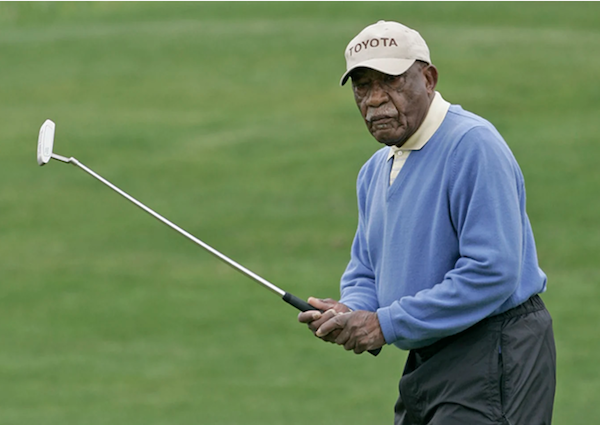
Charlie Sifford was the first black man permitted to play on the PGA tour.
Lee Elder, the recently deceased black professional golfer, put a lot of pressure on himself to win a PGA Tournament and qualify to play in the Masters tournament.
This was a sorry spectacle for such a great player. Before the early 1970s, the Masters organization kept mimicking Peanut’s Lucy, snatching away the football. They kept changing the eligibility requirements at the end of each year to keep blacks from playing.
We labeled Augusta National, the golf club that runs the Masters, the last plantation in America. Clifford Roberts, who co-founded Augusta National and then the Masters Tournament with Bobby Jones, declared in the 1960s, “As long as I’m alive, all the golfers will be white, and all the caddies will be black.”
I agreed with the great African American golfer Charlie Sifford who questioned how people could regard the Masters so highly while it excluded people.
“As long as I’m alive, all the golfers will be white, and all the caddies will be black.” — Cliff Roberts, co-founder of Augusta National and the Masters Tournament
The Masters’ “Lucy” routine started in 1955 when Charlie Sifford — who was prohibited from playing on the American PGA Tour – shot 63 in the opening round and led the Canadian Open. That evening the Masters sent word to the course in Canada that they were no longer providing an automatic invitation to the winner of the Canadian Open.
This practice of varying the qualifications for the Masters continued through the 1960s as African American golfer Pete Brown won the Waco Turner Open in 1964, three years after Blacks were finally permitted to join the PGA Tour. And he won the San Diego Open in 1968. Likewise, Sifford won the Greater Hartford Open in 1967 and the Los Angeles Open in 1969. Before 1961 each of these victories would have qualified these men for the Masters the following year.
The public put pressure on the PGA Tour to disassociate itself from the Masters because of its continued resistance to Black participation, which was apparent because of its changing qualifications. As a result of this pressure the Masters, in 1972, established set qualifications for the tournament, including winning a Tour event since the last Masters.
After this change, Elder intensified his efforts to win his first Tour tournament and thus qualify for the Masters. Thinking he was past due for a win, I followed him as a spectator at several events before he won the Monsanto Open in 1974. As a result, he received his invitation to the Masters in 1975, the first Black.
Charlie Sifford was the more significant “first.” He was part of a team that included amateur golfer Joe Louis — the great heavyweight champion — and pro golfers Bill Spiller and Ted Rhodes that carried on a long campaign for African American admittance to the PGA Tour. After a decade of effort, they finally succeeded, and Charlie Sifford gained entrance to the Tour in 1961 — the first Black.
At 39 years of age, Sifford was past his prime when he was permitted on the Tour. But he still won two tournaments. Sifford was indeed the Jackie Robinson of golf, as he was the pioneer, and he suffered plenty of racial abuse and threats.
The wrong story prevails if the emphasis is on a person who is the “first” allowed in, rather than white racism that prevented an earlier entry.
Sifford was honored for his path-breaking career, receiving many awards and commendations. For his contributions to golf, Sifford was inducted into the World Golf Hall of Fame in 2004. He received the Presidential Medal of Freedom in 2014, and he was awarded the Old Tom Morris Award in 2007. The Old Tom Morris Award is the Golf Course Superintendents Association of America’s most prestigious honor, a lifetime award named after the most storied name in golf from 19th century Scotland. Sifford also received an honorary doctorate from the University of St. Andrews, the “home of golf.”
This year, before his passing, Elder received significant honors. In April, he was an honorary starter at the Masters, along with Jack Nicklaus and Gary Player. In addition, Augusta National funded a women’s golf program in his name at the local HBCU, Paine College. They also established two scholarships in his name—one for a male and a female.
I would not deny Lee Elder his honors. However, I think they should be for other things he did, like fighting against racism in golf and funding youth programs. Not for walking through an opened door.
So what? You may ask. For one thing, this “first Black” business breeds inferiority. The wrong story prevails if the emphasis is on a person who is the “first” allowed in, rather than white racism that prevented an earlier entry. For example, W.E.B. DuBois being the first African American to obtain a Ph.D. from Harvard suggests — but it shouldn’t — that DuBois was the first African American capable of such a feat.
Lavish attention to dubious firsts can be harmful.
• • •• • •
Wornie Reed is Professor of Sociology and Africana Studies and Director of the Race and Social Policy Research Center at Virginia Tech University. Previously he developed and directed the Urban Child Research Center in the Maxine Goodman Levin College of Urban Affairs at Cleveland State University (1991-2001), where he was also Professor of Sociology and Urban Studies (1991-2004). He was Adjunct Professor at the Case Western Reserve University School of Medicine (2003-4). Professor Reed served a three-year term (1990-92) as President of the National Congress of Black Faculty, and he is past president of the National Association of Black Sociologists (2000-01).
This column first appeared online at What the Data Say and is shared here by permission.















